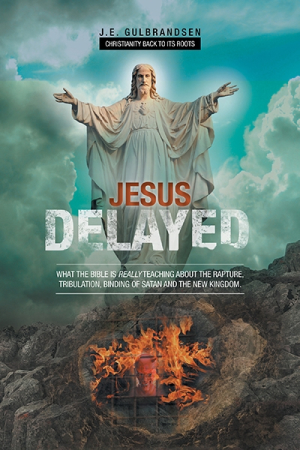
Jesus Delayed
What the Bible Is Really Teaching about the Rapture, Tribulation, Binding of Satan and the New Kingdom
Turning dispensationalist theology on its head, this work argues that Christians can experience joy now and look forward to the future.
J. E. Gulbrandsen’s Jesus Delayed: What the Bible is Really Teaching about the Rapture, Tribulation, Binding of Satan and the New Kingdom offers Christians a game-changing look at end-times theology.
This work boldly declares that most of the frightening events described in the book of Revelation are a matter of history, that Jesus’s victory on the cross was real, and that he is ruling the world now—a world that promises to become increasingly better as more and more people come to be filled with the Holy Spirit and take their places in Jesus’s kingdom.
Gulbrandsen himself was raised in a devout, evangelical Christian family. His struggle to make sense of the dispensationalist end-times views that are common in evangelical churches—beliefs that breed fear, anxiety, and dread of the future—led him to engage in countless hours of Bible study under, he says, the guidance of the Holy Spirit.
Those studies brought Gulbrandsen to a view that is the same as, or very similar to, what is known as “Partial Preterism.” This brighter, more optimistic viewpoint, which the author believes will replace dispensationalism to become mainstream theology within twenty years, is showcased in Jesus Delayed.
“What the Holy Spirit taught me has forever changed the way I anticipate the return of Jesus Christ,” Gulbrandsen writes. “Suddenly all the pieces of the puzzle fit together and make sense.” He arrives at his conclusions by interweaving elements of faith, scripture, and history.
Events described in the works of Josephus, Gulbrandsen believes, were also the “end-time” events described in the book of Revelation. His explanations make sense if, as he claims, the book’s prophecies were directed at the Jewish people of the period and terms like “soon” and “this generation” are literal.
Setting a “theological challenge” before fellow Christians, the book recommends studying these findings with faith and open-mindedness, affirming that the Holy Spirit is able to reveal truth to anyone who asks.
The volume is divided into two parts; the second offers guidelines for studying the topics discussed in the first. Although this arrangement may make the book more accessible to those not interested in deeper study, it also results in a text that is repetitive.
Occasional misspellings, grammatical mistakes, and errors in subject-verb agreement and tense are an additional impediment. Some of the author’s statements are off-putting, such as a declaration that Judaism is dead.
Jesus Delayed makes a good case that, because of Jesus’s victory on the cross, Christians can have joy in the present and look forward to the future with hope and confidence.
Reviewed by
Kristine Morris
Disclosure: This article is not an endorsement, but a review. The publisher of this book provided free copies of the book and paid a small fee to have their book reviewed by a professional reviewer. Foreword Reviews and Clarion Reviews make no guarantee that the publisher will receive a positive review. Foreword Magazine, Inc. is disclosing this in accordance with the Federal Trade Commission’s 16 CFR, Part 255.
